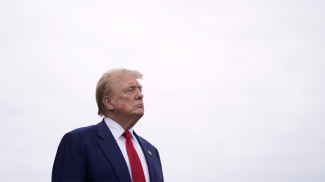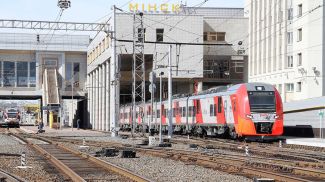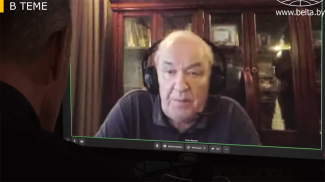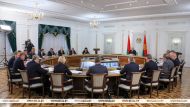The opinion poll in Belarus was commissioned by the BelTA news agency and was conducted by the EcooM think tank with the involvement of the Ukrainian Policy Foundation and in cooperation with the sociological centers accredited in Belarus. The survey was carried out from 12 January to 8 February. Using paper questionnaires and tablets, pollsters interviewed 9,896 respondents in 108 localities across all regions of Belarus, sampling the Belarusian population older than 18 by gender, age, level of education, type of settlement and region.
Respondents were asked to fill in formal questionnaires. Pollsters also asked respondents about their needs and expectations, and collected proposals to improve the government policy in various fields. The emphasis was on open-ended questions to learn the personal point of view of respondents. Sergei Musiyenko, director of the EcooM center, commented on the findings of the survey in an interview with BelTA.
Some 29.2% of the respondents said their financial wellbeing did not change over the past year, 14.9% said that it improved or improved a little.
“I would like to highlight that last year was a Covid-ridden year. Europe is in lockdown, people are staying at home, not working. In Belarus about 15% of the population believe their financial well-being improved or improved a little. The survey interviewed almost 10,000 people. This is a very serious figure. The number of people saying that their financial situation did not change is also high. And it is, of course, a welcoming fact. In principle, this corresponds to what is happening, because we, by and large, did not experience drastic changes in our lives. We did not experience the way Europe is living today, where people have to text the police for permission to go out. If you want to go shopping to get yourself, for example, a pair of socks, you have to sign up and wait for your turn on the queue list to get a permission. They need a permission to go to a clinic, a pharmacy. Things are different in our country. Those people who talk about life getting more difficult don't know what they are talking about. It would be cool if they put cameras in Brussels, Berlin ... to film the life in these cities and then broadcast it in our cities and vice versa – to show our cities bustling with life and roads teeming with cars. They do not have it there. We should have shown a comparative analysis of life here and there where people get beaten by the police for not wearing face masks. This is something of a shock for us while it is the norm there. Italians want to holiday in Belarus in our health promotion centers. After all, people have been in self-isolation and under total control for 9-10 months,” Sergei Musiyenko said.
Only 1% of the polled found it difficult to answer at all. “People are concerned about this issue. It affects everyone,” the director of EcooM noted.
Respondents were also asked to answer an open-ended question: if your life deteriorates, who do you blame? “32.8% of the respondents had no answer. Indirectly, this suggests that life is not deteriorating. This matter is not pressing for people. 16.9% blamed themselves. This, of course, merits attention, because 25 years ago we blamed the government for everything but not ourselves. This answer suggests that there has been a change in social thinking, that big changes are taking place. Some 7.4% of the polled traditionally blame the government. At the same time, the political opposition gained as much as 7.3% already. People take note of its calls to worsen their lives, of its calls for strikes at enterprises, calls for sanctions. Who are the sanctions against? Against us? Verbal economic intervention with negative results! As long as this group of political opposition is doing this, this figure will keep growing. Please, note that the president got 4.5% in the poll of 10,000 people. This speaks volumes. At the same time, 2.9% of the respondents believe that foreign governments are to blame for the deterioration of our living standards. After all, governments of other countries actively call for making our life harder, we see interference in our affairs, and people also acknowledge this. In fact, this is a reflection of what is happening,” Sergei Musiyenko said.
An important point is that 1% of Belarusians put the blame on local authorities and 0.2% on entrepreneurs. “You see, we immediately pass the buck to the state, the president, instead of looking around us, at our employer, our environment. In other words, we immediately transfer the accountability to a very high level. If your tap starts leaking, you write to the president right away. If your courtyard is not cleaned properly, you should take a shovel and clean it yourself. However, instead of doing it, you place the blame on the authorities. Thus, here is this huge gap: almost 17% blame themselves, while local authorities and enterprises are not even mentioned. It seems that they are non-existent. If anything happens, the blame immediately goes to the president or the state as a whole. But what are they to blame, what is their fault? This is a very serious question. The fact that oligarchs and mafiosi got 0.1% each is also very indicative. In the neighboring countries like Russia and Ukraine, the answer will be completely different. You see, this is an answer to an open-ended question. We have no oligarchs and crime is low,” the director of EcooM noted.
If the economic situation deteriorates in the near future, 63.5% of Belarusians say they will rely on themselves to improve their lives. “This is the issue the president drew attention to when he spoke at the Belarusian People's Congress. He cited this figure by memory. It actually sticks out and is remembered. This is a huge success, in my opinion. In other words, people realize that a lot depends on everyone personally. This is already a very high share of people. This means that the state and society are moving along the right path. People are coming to realize that they should not just sit and wait patiently for better times. Very few people said that they will join economic strikes (1.1%) or political strikes (0.3%), or an organization seeking a change of power through elections (4.6%). I like these kinds of questions, because they give a glimpse at people who sympathize with the opposition and want to change the regime or the form of government of the country. In fact, this means that the core of active supporters of not quite right changes makes up about 6%,” the expert emphasized.
The question: what should be done to resolve the problems facing the Belarusian society today scored about 2,000 answers. “This is an open-ended question, and it takes a lot of effort to process the answers. Therefore, there was a time lag. No artificial intelligence will help with that. These answers require a thorough analysis. Some 6.8% believe that the election of a new president is a way out. We saw the same kind of answers in the previous question that was formulated in a completely different way. Some 5.8% named patriotic education and ideology as a solution. This is what is particularly relevant right now, though the poll was conducted in February. I think that today society is more mature for this and this work should be approached in a comprehensive way. The past events had an impact, too. Another 7.2% mentioned fair salaries. Tell me, why are they unfair? You are paid as much as you deserve for your work. Our salaries are decent in comparison with salaries in many other countries. They may be smaller, but we pay less for housing and utilities and have free healthcare services, which overshadows everything else,” Sergei Musiyenko said. “A dialogue with the authorities and the ability to compromise was mentioned by 4.8% of the respondents. This approach is not shared by people who are unwilling to compromise, who block traffic, preventing other people from picking up their kids from kindergartens or enjoying their free time on Saturdays. Both sides should be ready to compromise, not only the authorities should seek it, but also the opposition. Another 3.9% want the protests to stop and 2.6% stressed the importance of national unity,” he added.
Only 0.7% of the polled opted for turning Belarus into a parliamentary republic, and just 0.2% want to bring back the Constitution of 1994. “We are not going to change the current Constitution drastically, this is not what the society wants, our other surveys also showed this. Indeed, the Constitution will be amended, after all it has been in place for a quarter of a century. But these amendments will be made in a calm manner and after consultations with numerous experts,” Sergei Musiyenko noted.
The next group of questions concerned foreign countries. The respondents were asked to assess actions of other countries and international associations in response to the events in Belarus. “As many as 56.1% of Belarusians believe that the relations with Russia are developing positively, or rather positively. This is a fair reflection of the situation, because Russia supports us. Some 9% and 7.5% gave the answers ‘rather negatively' and ‘negatively' respectively. People's assessment of actions of the European Union dramatically differs from those of Russia's: 40% view them negatively and rather negatively, 30% are undecided, and 7.3% view them positively. Of course, actions of the United States are disliked even more, with only 11.6% of the respondents viewing them positively or rather positively. This is because the United States is currently pursuing a policy that is unacceptable for the majority of our people. As for China, more than 45% of the polled view it positively, placing it close to Russia. Actions of the Baltic states are viewed positively only by 4.6% of the respondents, the ones I have mentioned, with 8.5% – rather positively. The attitude to Poland's stance is similar. Ukraine and the United Kingdom did not perform well in the survey, too. This means that people notice when countries adopt a negative stance for some odd reason. They do not let it slide. They see that some countries allow themselves to treat our country poorly. This is the only way people see it,” the expert pointed out.
The third group of questions was about mass media. The pollsters were surprised by some answers. “When we analyzed this group of questions, we saw an interesting thing that we had not taken into account when we phrased these questions, because communication means are developing and integrating. For example, is YouTube a mass media outlet? It is a popular source of information, many people follow TV channels on YouTube. What do they watch there? This is a dilemma we faced. These are not social networks, news sites or messengers. This phenomenon did not exist before. Today TV channels as well as other mass media have accounts in Telegram and other social networks. People sign up for them. What we see is a mix of various forms of content presentation. I think we need to explore this issue more involving mass media specialists,” the EcooM director stressed.
When asked what sources of information they use, Belarusians responded the following: 38.9% - social networks, 57.2% - television, 52.3% - information and news sites, 38.7% - messengers, 27.6% - print media, 14.3% - radio. “And then there goes the question of credibility, efficiency, topicality. In my opinion, this is a telling question, too. Just look, in terms of news delivery social networks scored 39%, messengers – 37.2%. But in terms of credibility they have 19.2% and 15.4% respectively. Print media are the most respected and trusted (37.8%). They verify information through a filter of editors, deputy editors, copy editors, correspondents, proofreaders. Are messengers doing the same? Indeed, they are fast but what's then? You can sign up for a dozen of such channels and still question their credibility,” Sergei Musiyenko added. “Let's look at topicality: social networks - 24.1%, television – 34.8%, information and news sites – 33.6%, print media – 35.4%. Basically, they enjoy trust. As far as radio is concerned, 45.6% of pollees found it difficult to answer. They either do not listen to it at all or listen to music programs, which are not information sources. We see these processes, radio is becoming a spent force. Yet radio channels make broadcasts and upload videos on the internet. They are turning into information and news sites. Probably, this is the reason why they have such a big percentage.”
What concerns the sources of information themselves, 50.2% of people watch TV to learn about politics, 42.3% - accidents and emergencies, 39.7% - health and medicine, 39.2% - entertainment, 36.7% - economy, 32.8% - sport. In print media the most in-demand topics are health and medicine, as well as politics and environment (34.8% and 28.9% respectively). Information and news sites post the following figures: accidents and emergencies – 45.3%, sport – 33.6%, entertainment – 27.4%.
“People have noticed changes in the style and delivery of political programs, they see new faces. Most likely, this has played its role. Indeed, politics can lose the top spot, accidents and emergencies will stay there. But the situation is like that right now. Medicine and politics make headlines in print media, too. People are also concerned about environment, but mostly when it affects their lives like problems with water supply. Print media, television, information and news sites offer quick updates, they explain what is going on and provide a water delivery map. Sport is second-to-last in the press. It is also understandable,” the expert said. “Entertainment is the most popular topic in social networks. It is easy to look up cinemas, theaters, concerts. It is accessible – you can read while commuting. Health and medicine are in the third place. The data for messengers is the same.”
As for radio, 4.4% of pollees listen to accident reports, 4% of people look for cultural news, 3.9% - for entertainment information.













